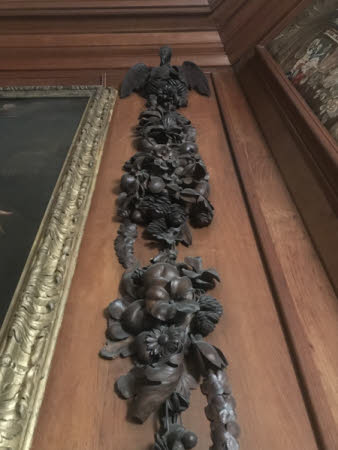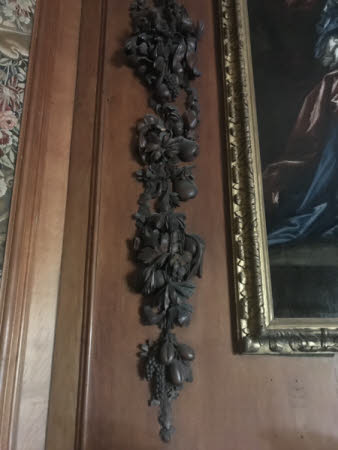Pair of carved limewood wall drops showing a Pelican in her Piety, fruit, flowers and foliage
probably George Jackson & Sons Ltd
Category
Art / Sculpture
Date
Unknown
Materials
Limewood
Measurements
3050 mm (H)
Place of origin
London
Order this imageCollection
Belton House, Lincolnshire
NT 435045
Summary
Limewood, pair of carved and stained applique drops with the Pelican in her Piety, fruit, flowers and foliage, probably George Jackson & Sons, c.1890. At the top of the drops is a carving of a pelican standing on a nest surrounded by her three chicks. She has pecked her breast to release blood which feeds her young. The drop continues in a garland of daisies, poppies, tulips, snowdrops, pears, roses, lilies, crocuses, acanthus and shamrock.
Full description
The Tapestry Room was redecorated by Jeffry Wyatville (1766-1840) in 1811-12 and remodelled again in around 1890 by the 3rd Earl Brownlow (1844-1921) in a neo-Caroline style. New panelling in oak was provided for the walls and George Jackson & Sons put up a pastiche plaster ceiling and probably also supplied these limewood carvings installed above the chimneypiece. The firm also produced the gilded carved overmantel in the Hondecoeter Room (NT 435155) and probably the Tyrconnel overmantle (NT 434857). The motif of a pelican in her piety depicts a pelican wounding her own breast so that the blood can feed her young, symbolising the Passion of Christ and the Eucharist. Grinling Gibbons (1648-1721) depicted a pelican in her piety in his 1686 reredos of St Mary Abchurch, City of London. Carvings in the style of Gibbons appear in the Marble Hall, Saloon, Tyrconnel Room and Chapel Gallery and Chapel of Belton House. Alice Rylance-Watson October 2018
Provenance
Purchased with a grant from the National Heritage Memorial Fund (NHMF) from Edward John Peregrine Cust, 7th Baron Brownlow, C. St J. (b.1936) in 1984.
Credit line
Belton House, The Brownlow Collection (acquired with the help of the National Heritage Memorial Fund by the National Trust in 1994)
Makers and roles
probably George Jackson & Sons Ltd, architectural ornamentalists

